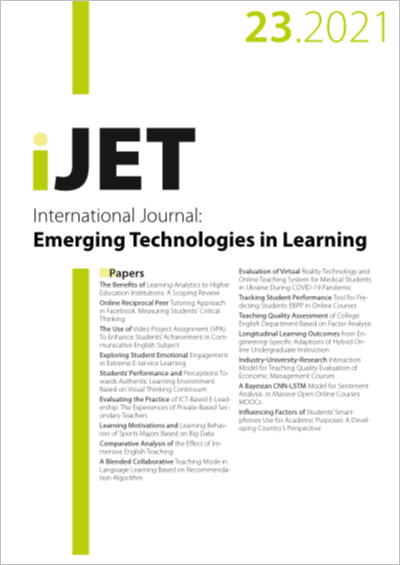A Bayesian CNN-LSTM Model for Sentiment Analysis in Massive Open Online Courses MOOCs
DOI:
https://doi.org/10.3991/ijet.v16i23.24457Keywords:
MOOCs, Sentiment Analysis, Deep LearningAbstract
Massive Open Online Courses (MOOCs) are increasingly used by learn-ers to acquire knowledge and develop new skills. MOOCs provide a trove of data that can be leveraged to better assist learners, including behavioral data from built-in collaborative tools such as discussion boards and course wikis. Data tracing social interactions among learners are especially inter-esting as their analyses help improve MOOCs’ effectiveness. We particular-ly perform sentiment analysis on such data to predict learners at risk of dropping out, measure the success of the MOOC, and personalize the MOOC according to a learner’s behavior and detected emotions. In this pa-per, we propose a novel approach to sentiment analysis that combines the advantages of the deep learning architectures CNN and LSTM. To avoid highly uncertain predictions, we utilize a Bayesian neural network (BNN) model to quantify uncertainty within the sentiment analysis task. Our em-pirical results indicate that: 1) The Bayesian CNN-LSTM model provides interesting performance compared to other models (CNN-LSTM, CNN, LSTM) in terms of accuracy, precision, recall, and F1-Score; and 2) there is a high correlation between the sentiment in forum posts and the dropout rate in MOOCs.
Downloads
Published
2021-12-08
How to Cite
Mrhar, K., Benhiba, L., Bourekkache, S., & Abik, M. (2021). A Bayesian CNN-LSTM Model for Sentiment Analysis in Massive Open Online Courses MOOCs. International Journal of Emerging Technologies in Learning (iJET), 16(23), pp. 216–232. https://doi.org/10.3991/ijet.v16i23.24457
Issue
Section
Papers
License
Copyright (c) 2021 khaoula mrhar, Lamia Benhiba, Samir Bourekkache, Mounia Abik

This work is licensed under a Creative Commons Attribution 4.0 International License.



